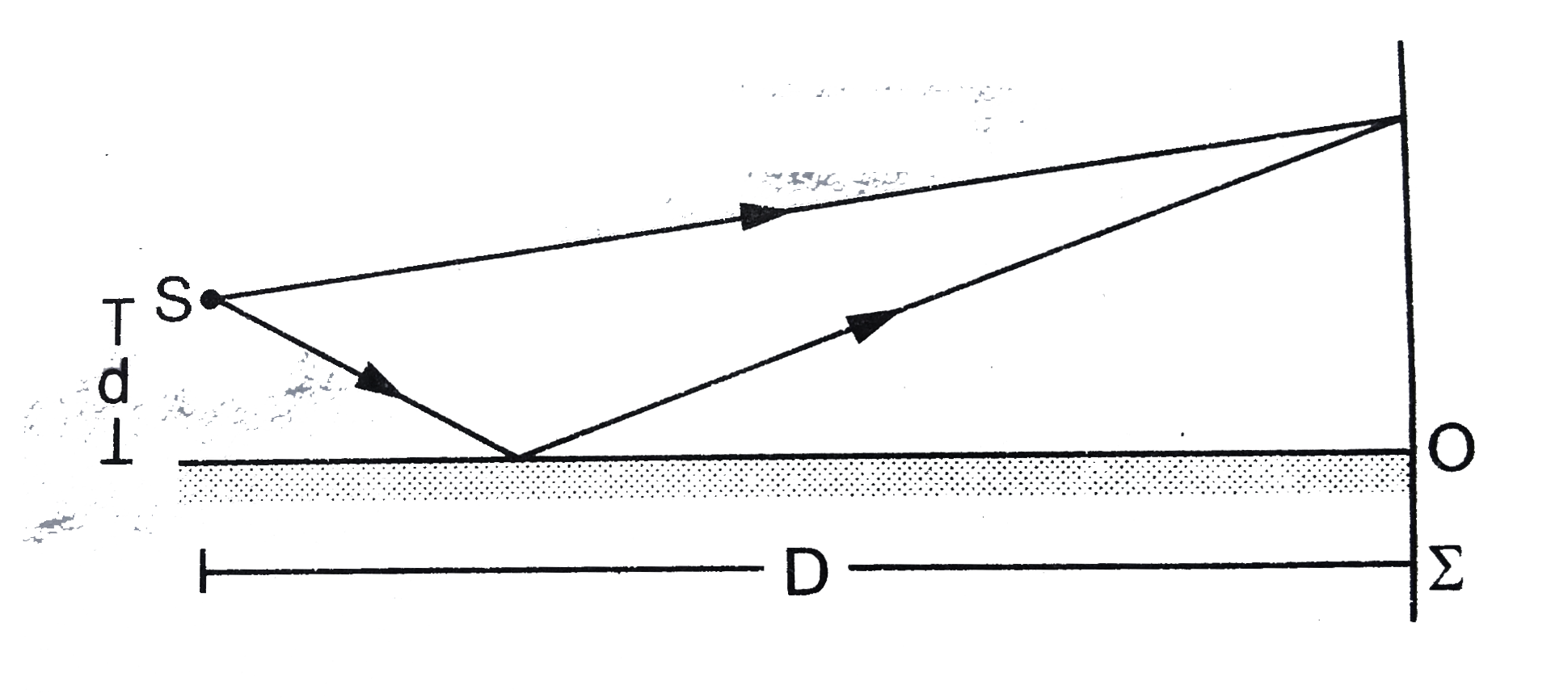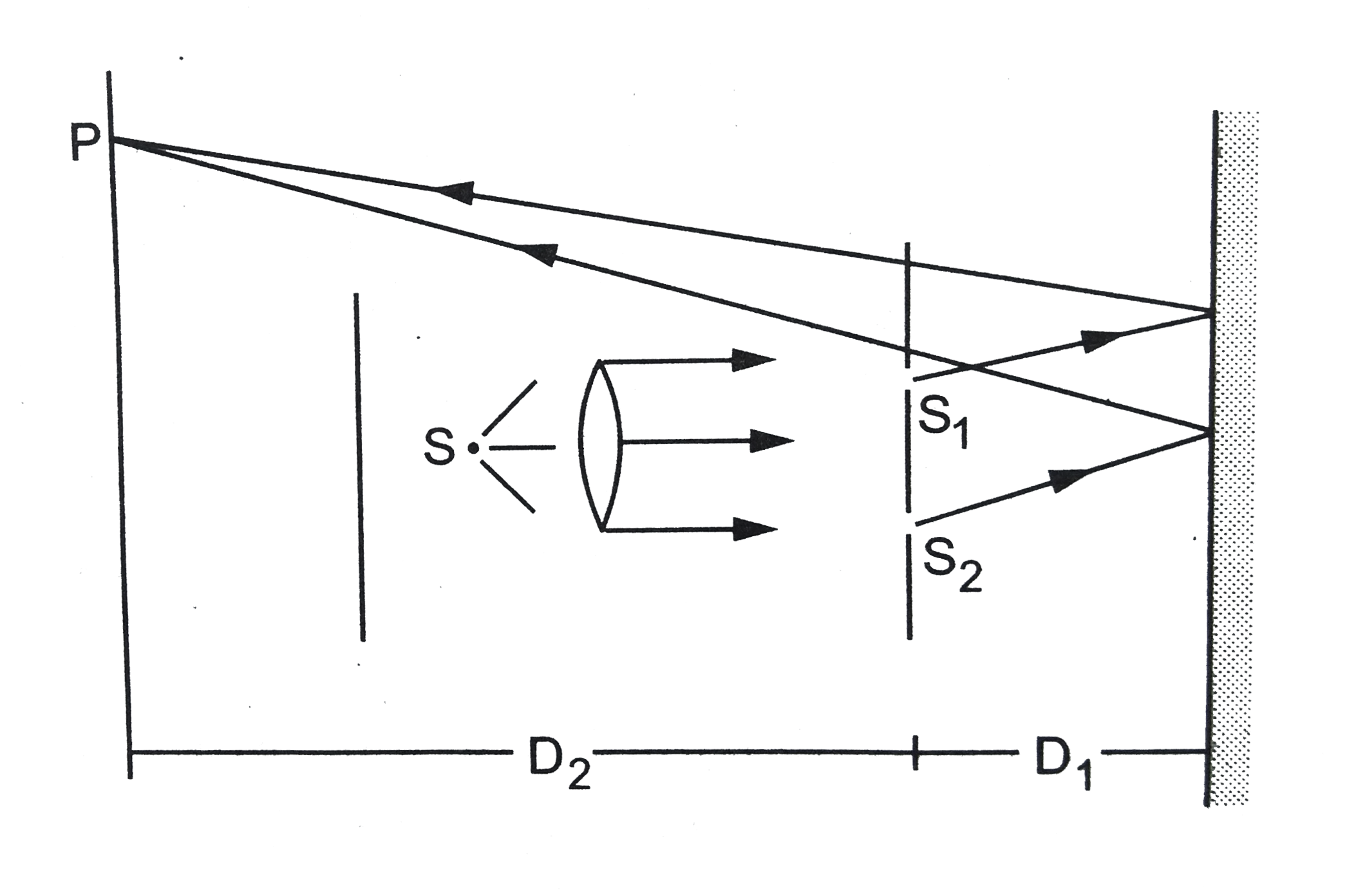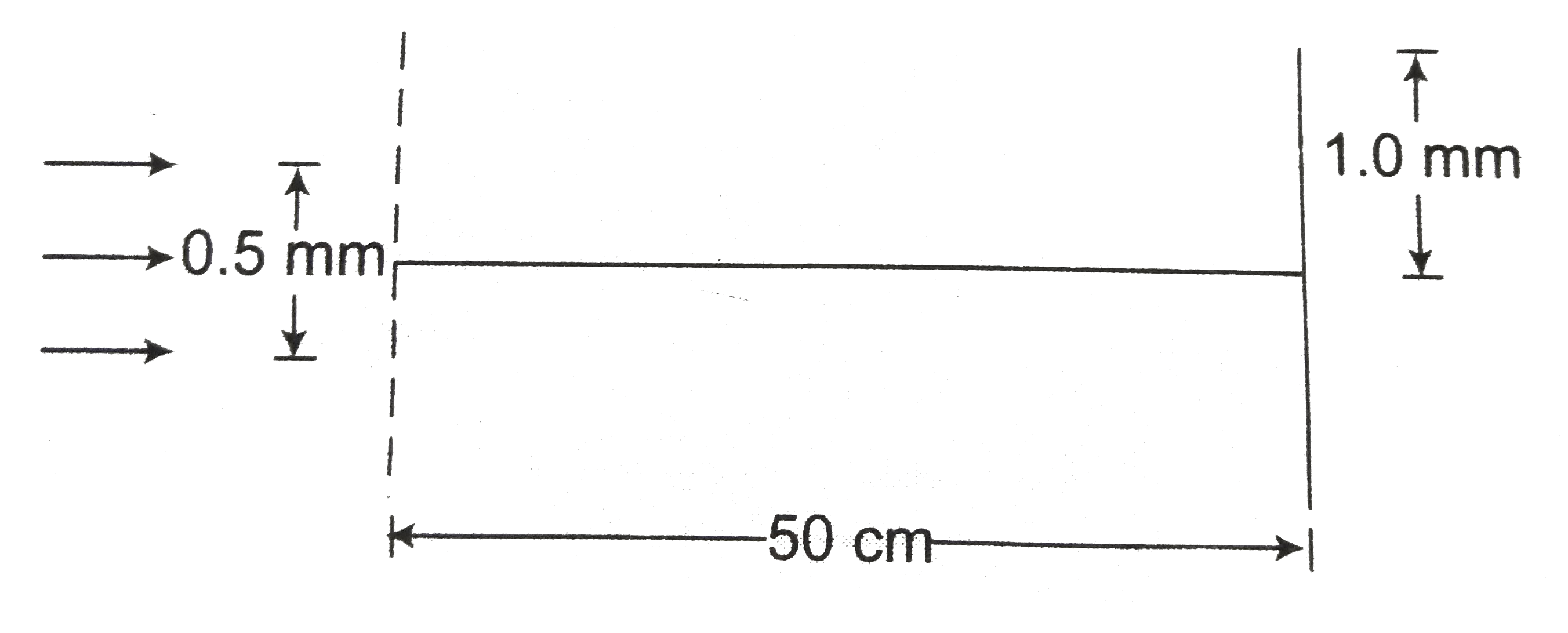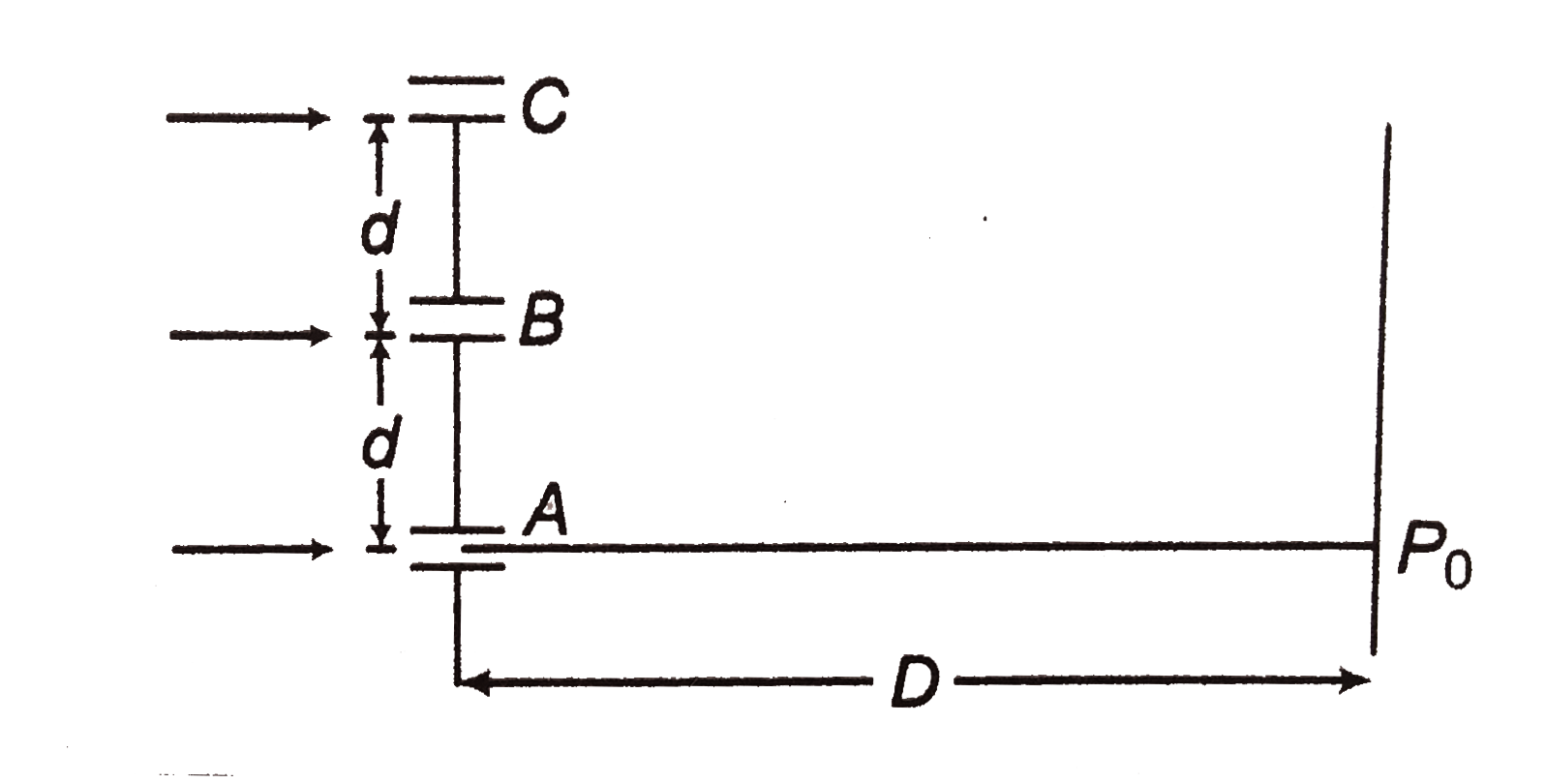Exercises from HC VERMA PHYSICS (ENGLISH) LIGHT WAVES for Class 12
| Class 12 | PHYSICS |
| Chapter | LIGHT WAVES |
| HC VERMA PHYSICS (ENGLISH) | Exercises |
| Medium | English |
| Academic Year | 2023-2024 |
Question 5
Two narrow slits emitting light in phase are separated by a distance of 1-0 cm. The wavelength of the light is 5.0x10−7 m. The interference pattern is observed on a screen placed at a distance of 1-0 m. (a) Find the separation between the consecutive maxima. Can you expect to distinguish between these maxima ? (b) Find the separation between the sources which will give a separation of 1.0 mm between the consecutive maxima. View SolutionQuestion 7
In a double slit interference experiment, the separation between the slits is 1.0 mm, the wavelength of light used is 5.0x10−7 m and the distance of the screen from the slits is 1.0 m. (a) Find the distance of the centre of the first minimum from the centre of the central maximum. (b) How many bright fringes are formed in one centimeter width on the screen ? View SolutionQuestion 10
A source emitting light of wavelengths 480 nm and 600 nm is used in a double slit interference experiment. The separation between the slits is 0.25 mm and the interference is observed on a screen placed at 150 cm from the slits. Find the linear separation between the first maximum (next to the central maximum) corresponding to the two wavelengths. View SolutionQuestion 13
A plate of thickness t made of a material of refractive index μ is placed in front of one of the slits in a double slit experiment. (a) Find the changes in he optical path due to introduction of the plate. (b) Wht should be the minimum thickness t which will make the intensity at the centre of the fringe pattern zero ? Wavelength of the light used is λ. Neglect any absorption of light in the plate.View SolutionQuestion 15
In a Young's double slit experiment using monochromatic light, the fringe pattern shifts by as certasin distance on the screen when a mica sheet of refractive inde 1.6 and thickness 1.964 micron (1 micron =10−6m) is introduced in the path of one of the interfering waves. The mica sheet is then removed and the distance between the screen and the slits is doubled. It is found that the distance between the successive maxima now is the same as the observed frige-shift upon the introduction of the mica sheet. Calculate the wavelength of the monochromatic light used in the experiment.View SolutionQuestion 16
A mica strip and a polysterence strip are fitted on the two slite of a double slit apparatus. The thickness of the strips is 0.50 mm and the separation between the slits is 0.12 cm. The refractive index of mica and polysterene are 1.58 and 1.55 respectively for the light of wavelength 590 nm which is used in the experiment. The interference is observed on a screen a distance one meter away. (a) What would be the fringe- width ? (b) At what distance from the centre will the first maximum be located ?View SolutionQuestion 17
Two transparent slabs having equal thickness but different refractive indices μ1andμ2, are pasted side by side to form a composite slab. This slab is placed just after the double slit in a Young's experiment so that the light from one slit goes through one material and the light from the other slit goes through the other material. What should be the minimum thickness of the slab so that there is a minimum at the point P0 which is equidistant from the slits ? View SolutionQuestion 18
A thin paper of thickness 0.02 mm having a refractive index 1.45 is pasted across one of the slits in a YDSE. The paper transimits 4/9 of the light energy falling on it.
a. Find the ratio of maximum intensity to the minimum intensity in interference pattern.
b. How many fringes will cross through the center if an indentical paper piece is pasted on the other slit also? The wavelength of the light used is 600 nm.View SolutionQuestion 20
A parallel beam of monochromatic light is used in a Young's double slit experiment. The slits are separated by a distance d and the screen is placed parallel to the plane of the slits. Show that if the incident beam makes an angle θ=sin−1(λ2d) with the normal to the plane of the slits, there will be a dark fringe at the centre Po of the pattern. View SolutionQuestion 21
A narrow slit S transmitting light of wavelength λ is placed a distance d above a large plane mirror as shown in figure. The light coming directly from the slit and that coming after the reflection interference at a screen ∑ placed at a distance LD from the slit. a. What will be the intensity at a point just above the mirror. i.e., just above O? b. At what distance from O does the first maximum occur?
? View Solution
View SolutionQuestion 22
A long narrow horizontal slit is placed 1 mm above a horizontal plane mirror. The interference between the light coming directly from the slit and that after reflection is seen on a screen 1.0 m away from the slit, Find the fringe-width if the light used has a wavelength of 700 nm. View SolutionQuestion 24
A double slit S1−S2 is illuminated by a coherent light of wavelength λ. The slits are separated by a distance d. A plane mirror is placed in front of the double slit at a distance D1, from it and a screen ∑ is placed behind the double slit at a distance D2, from it . The screen ∑ receives only the light reflected by the mirror. Find the fringe-width of the interference pattern on the screen.
 View Solution
View SolutionQuestion 25
White coherent light (400nm−700nm) is sent through the slits of a YDSE. d=0.5mm, D=50 cm. There is a hole in the screen at a point 1.0mm away (along the width of the fringes) from the central line.
(a) Which wavelength will be absent in the light coming from the hole?
(b) Which wavelength(s) will have a strong intensity?
 View Solution
View SolutionQuestion 26
Consider the arrangement shown in figure. The distance D is large compared to the searated d between the slits. a. Find the minimum value of d so that there is a dark fringe at O. b. Suppose d has this value. Find the distance x at which the next bright firnnge is formed. c.Find teh fringe width.
 View Solution
View SolutionQuestion 29
In a Young's double slit experiment, the separation between the slits = 2.0 mm, the wavelength of the light = 600 nm and the distance of the screen from the slits = 2.0 m. If the intensity at the centre of the central maximum is 0.20Wm−2, what will be the intensity at a point 0.5 cm away from this centre along the width of the fringes ?View SolutionQuestion 30
In a Young's double slit interference experiment the fringe pattern is observed on a screen placed at a distance D from the slits. The slits are separated by a distance d and are illuminated by monochromatic light of wavelength λ. Find the distance from the central point where the intensity falls to (a) half the maximum, (b) one fourth of the maximum. View SolutionQuestion 32
The line-width of a bright fringe is sometimes defined as the separation between the points on the two sides of the central line where the intensity falls to half the maximum. Find the line-width of a bright fringe in a Young's double slit experiment in terms of λ, d and D where the symbols have their usual meaningsView SolutionQuestion 33
Consider the situation shown in figure. The two slits S1andS2 placed symmetrically around the central line are illuminated by a monochromatic light of wavelength λ. The separation between the slits is d. The light transmitted by the slits falls on a screen Σ1 placed at a distance D from the slits. The slit S3 is at the placed central line and the slit S4, is at a distance z from S3. Another screenΣ2 is placed a further distance D away from 1,1. Find the ratio of the maximum to minimum intensity observed on Σ2 if z is equal to a. z=λD2d b. λDd c. λD4d
 View Solution
View SolutionQuestion 34
Consider the arrangement shownin figure. By some mechanism,the separation between the slits S3andS4 can be changed. The intensity in measured at the point P which is at the common perpendicular bisector of S1S2andS3S4.Whenz=(Dlamda)/(2d)the∫ensitymeasuredatPisI.F∈dthis∫ensitywhenzisequal→<br>a.Dλd,b.3Dλ2d,c.2Dλd
 View Solution
View SolutionQuestion 38
A glass surface is coated by an oil film of uniform thickness 1.00×10−4cm. The index of refraction of the oil is 1.25 and that of the glass is 1.50. Find the wavelengths of light in the visible region (400nm-750nm) which are completely transmitted by the oil film under normal incidence.View Solution

